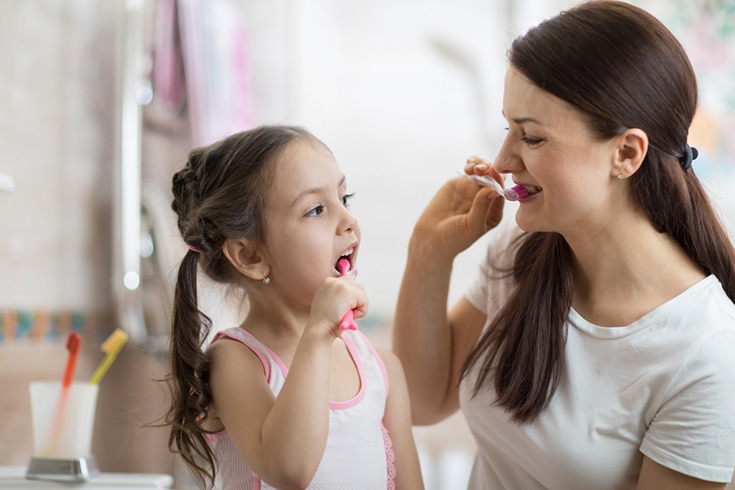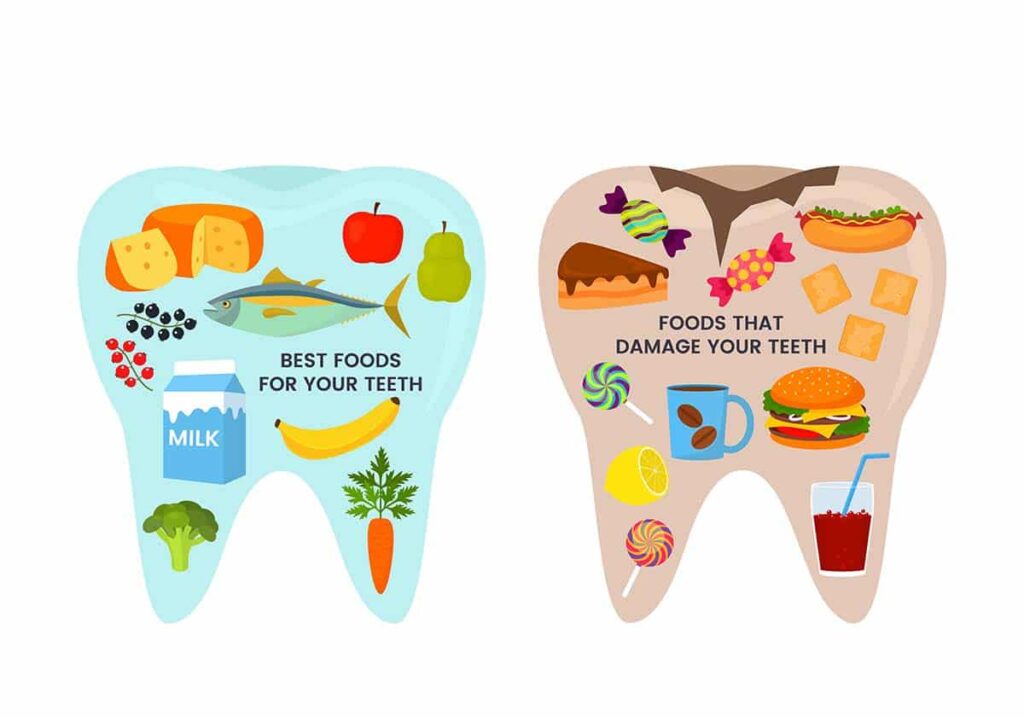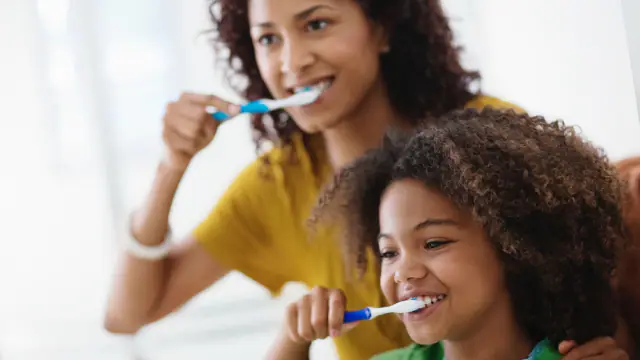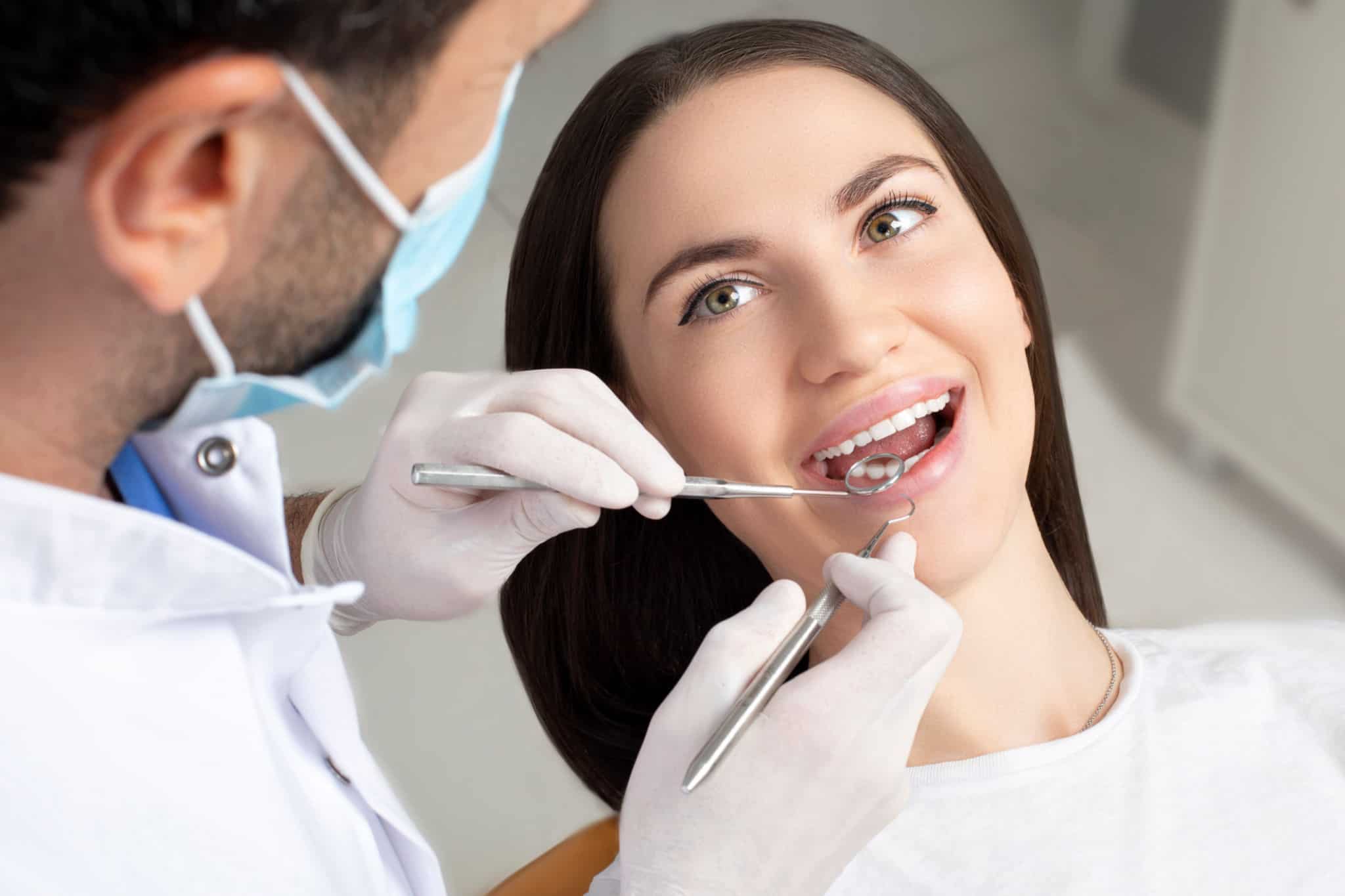A healthy smile is an investment in your child’s lifelong well-being! As a parent, you’re their oral health champion, guiding them towards great habits starting from day one. This comprehensive guide provides fun, age-appropriate tips to keep their smiles bright, from those first baby teeth through their teenage years. Let’s make oral care a positive part of their routine, setting the stage for a future filled with healthy, confident smiles.
Early Care is Crucial
- Wipe baby’s gums regularly – keep mouth clean for healthy teeth.
- Baby teeth health = strong permanent teeth.
Habits for Healthy Smiles
- Start brushing early (1-2 years old), 2x a day for 2 minutes.
- Floss by age 4. Help kids until they can do it alone (around age 8).
- Don’t forget those back teeth!
Diet Matters
- Healthy teeth love fruits, veggies, whole grains.
- Limit sugary snacks/drinks. Water is best!
- Smart snacks: cheese, yogurt, nuts.
Dental Visit Is the Key
- First dental visit by age 1.
- Regular checkups = clean teeth, strong smiles, and a happy dentist relationship.
Parents as Oral Health Heroes
- Kids copy you! Take care of your own teeth.
- Make brushing/flossing fun quality time.
- Supervise young kids for good techniques.
Early Dental Care: Foundation for Healthy Smiles
A child’s oral health journey begins long before their first tooth emerges. Healthy habits established from infancy lay a strong foundation for a lifetime of smiles. While baby teeth eventually fall out, their health greatly impacts the development of permanent teeth and overall well-being.
Starting Before the First Tooth
- Clearing the Way: Regularly wiping a baby’s gums with a soft, damp cloth after feedings removes lingering milk or formula residues. This reduces harmful bacteria and prepares their mouth for healthy tooth development.
- Soothing Sore Gums: As teeth begin to push through the gums, a gentle gum massage with a clean finger or cool washcloth can provide relief.
Baby Teeth Erupt: Brushing Begins!
The day a baby’s first tooth peeks through the gums are a cause for celebration, marking a special milestone. However, this exciting moment also calls for a serious shift in focus toward establishing a solid oral hygiene routine. It’s more than just keeping that tiny tooth clean; this is the start of a lifelong commitment. The oral care for kids that introduced from this point forward will shape not only the health of those first baby teeth but also the strength and resilience of the permanent teeth to come. This is a chance for parents and caregivers to instill the importance of dental care in a way that will resonate with a child throughout their life.
- Baby Teeth Matter for Adult Smiles: When the first tooth erupts, it’s time to start brushing! Use a tiny smear of non-fluoridated toothpaste on a soft-bristled, child-sized toothbrush. Be gentle and focus on cleaning both teeth and gums.
The Role of Fluoride: A Key Ingredient
Fluoride, a naturally occurring mineral with remarkable cavity-fighting properties, plays a critical role in reducing tooth decay and strengthening tooth enamel, and it is readily available in many sources, including community drinking water, toothpaste, and specialized mouth rinses.
How Fluoride Works?
Our teeth face constant acid attacks from bacteria, especially after sugary treats. This acid weakens tooth enamel, our teeth’s protective outer layer. Thankfully, fluoride acts like a superhero! It helps repair weakened enamel through a process called remineralization. Fluoride strengthens enamel, making it more resistant to acid and preventing cavities. Imagine fluoride as tiny patches fortifying your teeth. Regular fluoride exposure from water, toothpaste, and sometimes professional treatments keeps this process going, protecting your smile.
- Preventing Fluorosis: Too much fluoride is counterproductive. Children under 3 should only use a tiny smear of fluoride toothpaste. Avoid flavored toothpastes that may be tempting to swallow. Monitor them closely and consult with your dentist or pediatrician about fluoride exposure.
Brush & Floss Like a Pro: Kid-Friendly Tips
Start building healthy brushing as early as they can! By the age of 1 or 2, introduce a small, soft-bristled toothbrush. Help your child brush for two full minutes, twice a day, making sure they reach all surfaces of their teeth and tongue. This routine helps fight off bad breath and those pesky bacteria that cause cavities. Around age 4, it’s time for flossing! Show them how to gently clean between their teeth. By age 8, most kids are ready to take on flossing like a pro, but remember, proper technique is everything for getting rid of plaque.
Targeting Problem Areas
Even with good brushing, some areas are trickier to reach, particularly the back molars and the inner surfaces of your lower front teeth. These spots easily trap plaque, so take special care to angle your brush and clean every surface thoroughly. Focusing on these problem areas helps keep cavities at bay.
- Flossing Fundamentals: Introduce flossing around age 4. Help them to reach between teeth where a brush can’t. Children can usually floss independently by age 8.
Superfoods for Super Smiles
Strong teeth love healthy food! Fruits, veggies, whole grains give them the power to fight cavities. Limit sugary snacks and drinks (think party for bad breath!). Occasional snacks are okay but focus on meals to keep your smile sparkling!
Snacking Smart for Long-lasting Smiles
Ditch the cavity-causing cookies for that shine! Snacking doesn’t have to be a sugar fest. Cheese, a champion snack, strengthens teeth with calcium and phosphate. Yogurt with live cultures provides a probiotic punch to help fight bad bacteria. For a satisfying crunch, nuts like almonds offer calcium, protein, and healthy fats that keep you feeling full. These tooth-friendly treats are like tiny shields for your smile, unlike sugary snacks that feed the plaque monsters leading to cavities. So, next time hunger strikes, choose snacks that keep your smile sparkling and healthy!
- Beware of Sugar and Starch: Sugary drinks, candies, and processed snacks feed the bacteria that cause tooth decay. Limit these treats and always brush afterward.
Regular Dental Visits
The best smiles start early! The American Academy of Pediatric Dentistry recommends your child’s first dental visit by their first birthday, followed by checkups every six months. These visits aren’t just about finding cavities (though that’s important too!). They help your little one build a positive relationship with the dentist and learn how to keep their teeth strong. Plus, professional cleanings and fluoride treatments are like giving their smile a superpower boost!
The Role of Parents and Caregivers
You’re your child’s oral health hero! By taking care of your own teeth, you show them how important a healthy smile is. Turn brushing and flossing into quality time – a silly song or a two-minute dance party can make all the difference. Think of supervising their routine as quality control for their smile – it takes time for those tiny hands to master the job!
Dental Clinic Surrey, BC understands that smiles start young! Their pediatric dentistry team creates a fun, relaxing environment where kids feel safe and happy – think comfy chairs, friendly faces, and maybe even a favorite cartoon playing. From those first cleanings to braces, they offer everything growing smiles need, using the latest gentle techniques. City Dental Centre wants visits to be easy for kids and parents, offering calming options like sedation dentistry. Their goal is simple: healthy smiles, positive experiences, and a lifetime of good dental habits. Learn more on their website: Pediatric Dentistry Surrey
Conclusion
Taking care of baby teeth sets the stage for a strong and healthy adult smile. By following these tips and making dental care fun, you’re giving your child a gift that lasts a lifetime. Remember, those pearly whites aren’t just for beautiful photos – they’re essential for chewing, speaking, and feeling confident. A little effort now will make those smiles shine bright for years to come!
FAQs on Oral Care for Kids
Q1: My child hates brushing their teeth! How can I make it more enjoyable?
A1: Turn brushing into a game! Try playing a favorite song for two minutes, making silly faces, or letting your child choose a fun toothbrush.
Q2: At what age should my child start to floss?
A2: Introduce flossing around age 4 and help them with this task until they’re able to do it independently (usually around age 8).
Q3: Are sugary snacks completely off-limits?
A3: Occasional sugary treats are okay, but it’s best to limit them. Focus on healthy snacks most of the time, and always brush teeth thoroughly after sugary indulgences.
Q4: When should my child have their first dental visit?
A4: The American Academy of Pediatric Dentistry recommends a first dental visit by age 1. Early visits help catch potential problems and establish a positive relationship with dental care.









